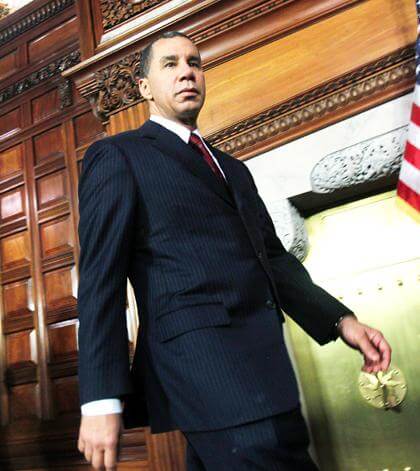By Philip Newman
Gov. David Paterson has come up with a new business tax plan to rescue the financially beleaguered MTA that Mayor Michael Bloomberg said was unfair to New York City “and contrary to every principle of good regional development.”
The mayor vowed to “work night and day” to defeat the governor’s plan.
Paterson’s plan was announced nearly a week after the transit agency disclosed it faces a new $350 million shortfall caused by tax receipts much lower than forecast.
The Metropolitan Transportation Authority had expected to remedy the original cash shortage with heavy cuts in bus, subway and commuter train service, including shutting down two subway lines and numerous bus lines and less frequent service.
Transit officials had planned no hikes in fares until next year, but now some sources suggest next year’s 7.5 percent fare hike might have to be increased.
Paterson’s plan would raise the payroll tax on businesses in New York City by 59 percent while reducing by half the tax on businesses in other counties in the 12 counties served by the MTA.
The payroll tax was approved by the state Legislature last year as a way to save the MTA from its financial straits. The tax is collected in the 12 counties with businesses collecting 0.32 percent for every $100 of payrolls.
Under Paterson’s plan, the tax would rise to 0.54 percent in New York City and would be cut to 0.17 percent in Suffolk, Nassau, Putnam, Orange, Westchester, Dutchess and Rockland counties.
MTA officials said the Paterson proposal, if approved by the Legislature, would bring in $230 million toward filling a $400 million budget gap.
Jeremy Soffin, chief spokesman for the MTA, said it would lessen the need for additional service cuts on top of those passed by the MTA board in December. “It would not eliminate the need for the service cuts and administrative reductions included in the MTA budget passed in December.”
Bloomberg assailed the Paterson proposal.
“The idea that the state can spare the suburbs while sacking the city is terrible economics, grossly unfair and contrary to every principle of good regional development,” Bloomberg said.
“I will work night and day with our city delegation in Albany to stop this wrong-headed proposal from moving forward,” Bloomberg said.
The shortages have been the result of what some elected officials said were unrealistic tax receipt estimates since the outset of the economic recession. For instance, the 12-county payroll tax was forecast to produce $1.5 billion a year, but have brought in far less than estimates.
The MTA also thrived for years on real estate fees and taxes when the city housing market sizzled.
The MTA plans to conduct public hearings in the city and other areas served by the agency next month on the planned cutbacks in service.
In other transit news:
• state Comptroller Thomas DiNapoli reported that the MTA paid $577 million last year for overtime, with some workers earning overtime that was more than 300 percent of their regular annual salary.
• Mayor Michael Bloomberg said the MTA should take another look at its policy of providing MTA retirees free bus and subway passes, particularly when the agency is considering taking away such passes for 600,000 schoolchildren.
• the MTA inspector general reported that the transit agency has been giving good evaluations to contractors who perform shoddy work because of what he called pressure from the MTA to keep contractors happy.
“Literally billions of dollars are at stake,” said MTA Inspector General Barry Kruger.
Reach contributing writer Philip Newman by e-mail at timesledgernews@cnglocal.com or phone at 718-260-4536.



































